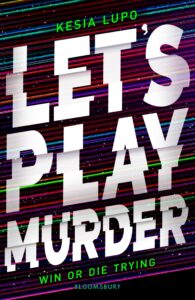This post was written by Kesia Lupo, author of Let’s Play Murder and is sponsored by Bloomsbury UK.
In summer 2021, right around the time I was wrestling the extremely slippery second draft of my dark and devious third novel, I decided to go for a hearing test. I’d suffered from hearing loss since a string of infections in my early childhood left the hardware of my ears permanently damaged – but now, at the age of 31, I felt it was deteriorating further and I wanted to know what was happening. The audiologist told me I could hear lower pitches pretty much fine, but in the upper pitches my loss slipped into ‘moderate’. That meant that some consonants – t’s and c’s and s’s – were hard for me to catch. That explained why I was constantly mishearing people and either bluffing out of embarrassment or asking them to repeat themselves, something which really made me feel stupid.
‘You would be totally justified in getting hearing aids,’ he said.
‘Do you think I need them?’ Already I felt reluctant.
‘You could go either way, but I think they would help a lot.’
I’d actually been told the same thing when I was younger, but I didn’t get hearing aids then. And I didn’t want to get them now, either, even though my hearing was worse.
Who, at the age of 16, or indeed 31, wore hearing aids? They’re not like glasses. They’re not ‘normal’ and that, especially for me as a teenager, means they should be avoided at all costs. Hearing aids are what you get when you’re officially old. I imagined beige NHS standard-issue monsters with big plastic tubes snaking into my ears, effectively a big neon sign telling everyone I was different.
But why did I think that? Why wouldn’t I wear something that would genuinely help me just because of all of these preconceptions? I decided to go for the hearing aids anyway. What’s more, I decided to give the main character of my Work In Progress hearing aids too.
View this post on Instagram
There have been so many conversations about representation in all its forms – and there are so many angles on the subject. But one angle is this: if you don’t see anyone like you in the media you consume, you start to think of yourself as ‘weird’. You start to want to disguise the things that make you different from what you see as the norm. I know as a teen, especially early on, I was obsessed with fitting in – I wish I hadn’t been. I wish that instead of mishearing my friends and fluffing to disguise it, or subtly trying to sit at the front of the class, or copying what everyone else did so I didn’t have to admit to not hearing, I’d had the confidence to ask for help.
This is not a book about hearing loss, though. In Let’s Play Murder, Veronica wears hearing aids incidentally. It doesn’t have an impact on the story, really; it’s just something she does. The story’s actually a murder mystery gone wrong, set in a VR game which is invaded by a malevolent presence. Veronica’s a murder mystery expert – her dad writes them for a living – and she needs to win the game’s insane cash prize to help her little brother. So, alongside four strangers, she throws herself into the puzzle. When one of the other players is killed, things get even more complicated…
Experiencing hearing aids for the first time while writing Veronica allowed me to include some fun details. Hearing aids back in the 80s – the VR game is set in 1989 and all clothes/accessories are period-consistent! – weren’t as sleek and capable as they are these days. I used feedback and the strange ringing noises you get as a result of contact to creepy effect – and when Veronica loses a hearing aid at one point, her spatial-sound awareness is thrown off-kilter. I was also lucky enough to have an authenticity reader who had been wearing aids for way longer than me, who helped ensure that my representation rang true.
I hope teens enjoy this book for what it is – a super scary murder mystery with a vintage VR twist – but I also hope they clock the representation. If I reach one teen with hearing loss and I make them feel a bit more normal, that’s awesome.
And by the way, I’ve never looked back.
 Get your copy of Let’s Play Murder by Kesia Lupo here.
Get your copy of Let’s Play Murder by Kesia Lupo here.


